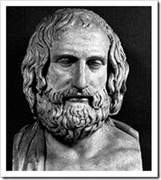The Sophists’ resurrection
 History repeats itself. In every age we see the recycling of previous
customs and ideas as if they are something new. Although we have modern
science and technology at our command, sometimes we bank on ancient
practices and rituals. For instance, we are living in an age in which
higher education is available to anyone who can afford to pay. History repeats itself. In every age we see the recycling of previous
customs and ideas as if they are something new. Although we have modern
science and technology at our command, sometimes we bank on ancient
practices and rituals. For instance, we are living in an age in which
higher education is available to anyone who can afford to pay.
Even a cursory glance at newspaper advertisements will prove that
courses leading to higher degrees cost millions of rupees. Many of the
Master’s degree courses in business, psychology and a host of other
subjects are available locally at a price. The course fee alone would
exceed Rs 1 million. There is a big demand for such courses as the state
universities are not in a position to accommodate a large number of
students.
At the same time most local universities are not equipped to conduct
such courses due to lack of trained professionals. This has led to the
proliferation of private colleges affiliated to foreign universities
which offer many postgraduate courses in various disciplines.
Greece
If you go back to Athens in Greece in the 5th century BC, you will
note the same situation prevailing at that time. There were
professionals known as Sophists who charged money for their teaching.
They were prepared to teach anyone who had the means. They did not look
into family background or any other qualifications. Many Sophists had
travelled widely and they were highly “sophist-icated”. In fact, the
word “sophisticated” originated in that period. The Sophists had a wide
knowledge of cultures, religious practices, morals and a fine taste in
clothing and food.
In a way, the Sophists were a type of social scientists who combined
sociology, psychology and anthropology. The Sophists’ knowledge was
viewed by the rulers as a threat to their existence. With education
spreading at an alarming rate, the privileged class could not feel
superior to others.
|

Protagoras: As to the Gods I have no means of knowing that
they exist or that they do not exist. |
The Sophists had their own philosophy of life. Being practical men,
they considered nothing was good or bad by nature. What was good and bad
was decided by custom. On the other hand, although people had different
goals, everybody sought some form of power. They believed that nobody
can be absolutely happy without power. Even today, most people wish to
have some power over the others despite modern education.
High Fees
The Sophists demanded payment for their services. The scene is being
re-enacted today with private educational institutions levying high fees
for their courses. In ancient Greece the Sophists knew how to sell their
products. Their glib talk and advertising skills attracted many young
people into their fold. However, the philosophers such as Aristotle ans
Plato did not appreciate what the Sophists were doing.
Plato referred to the Sophists as “paid hunters after the young and
wealthy.” Aristotle said, “the art of the Sophist is the semblance of
wisdom without the reality and the Sophist is one who makes money from
an apparent but unreal wisdom.” Many Athenians were not sure whether
Socrates was a Sophist or not. However, Socrates said, “It is wrong to
charge money for teaching philosophy.”
To their credit, we can say that the Sophists were systematic
thinkers who believed that the truth is relative. They said we should
accept what was true at the moment according to our culture. The
argument was not tenable because if there is no ultimate truth, no moral
code is universally correct. For them, moral values did not reflect a
divine or natural order.
Protagoras of Abdera (481-411 BCE) was perhaps the greatest of the
Sophists who taught wealthy Athenians. He himself became rich and
famous. As a typical Sophist, Protagoras travelled widely observing the
cultures of other countries. He said morals reflected social traditions.
His view that “man is the measure of all things” has been variously
interpreted.
Protagoras was a pragmatist. According to his theory of pragmatism,
beliefs are to be interpreted in terms of “whether they work” or “their
usefulness.” However, Plato did not agree with him He said that reducing
the concept of what is useful to whatever people think may be useful but
it is not acceptable.
It is said that Protagoras did not follow his own advice. Once he
held religion to the pragmatist test. His ideas offended the rulers. As
a result, some of his works were burnt. He tried to flee to Sicily but
the ship was wrecked and Protagoras drowned. |

